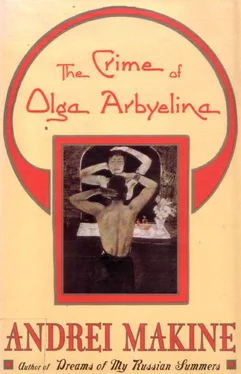Each evening was imperceptibly gaining a few more moments of light. And that evening it was particularly noticeable, for a narrow ray of coppery sunlight came streaming in obliquely at the kitchen window; from now on it was going to return, less unexpectedly and a little wider, each day.
It was by this already springlike light that she noticed a fine white film on the brown flowers of the infusion. She emptied it automatically on returning from the bathroom; went into the bedroom and froze, stunned. The bedroom, too, was bathed in light and had nothing nocturnal about it. And yet he could come in from one minute to the next!
She quickly drew the curtains (they were too narrow and always left a gap), threw some fragments of wood into the stove (they had stopped having fires more than a week before), and decided to put a lamp on her bedside table, the heavy lamp with the silk shade that generally stood on the shelves. Once switched on, it reduced the brilliance of the sun that was tangled in the branches of the willows and seemed determined not to set…
It was one of those clumsy and vague gestures that are made in the act of love. A hand suddenly forgetting how to move in the real world. She felt this hand, these cool, gentle fingers, touching her shoulder, folding round her breast…
Then the hand flitted away, describing a hesitant circle, unnecessarily broad (was he trying to move the lampshade that was too big, too close; to switch off the light?). With her eyes closed she sensed the movement and a second later came the noise. The start of the noise…
What happened was so swift and so irremediable that several hours later and even some days later she went on living in that instant just before the noise. She would come to the Caravanserai, meet the residents, and listen to them, but in the innermost part of herself the same scene continued to unfold; it could not end, once it ended life would have become impossible.
… From beneath her closed eyelids she was aware of a hand flitting about, as clumsy as a nocturnal bird obliged to fly in broad daylight. Feeling its way in the void, the hand knocked against the lampshade… The start of the noise came from the grinding of the lamp's china base against the wood of the little bedside table. Through her eyelashes she sensed the beginnings of a fall. Her reflex-china, breakage, cut hand, blood-forestalled all thought. She stretched out her arm. Realized immediately. Froze. The lamp fell. He tore himself away from this woman's body that had suddenly come to life, hurled himself from the room.
An elderly resident was talking to her about how the days were warm now but the nights still chilly. She agreed, echoing the trivial remarks made to her, but her own life was condensed into the vision of those few gestures: a hand reaches out aimlessly into the half light; a lampshade tilts; an arm is flung out; freezes…
And the scene explodes under the violent lighting of horror: a youth mired in a woman's groin. A mother and her son…
Her mind's eye remained imprisoned in that room, in the endless repetition of a suspended gesture. And also in that terrifying reflection in the mirror: a woman lying on her back, her knees apart, her belly offered, one arm outstretched, petrified.
And when she glanced outside, the flood tide of spring blinded her with its headlong joy. Everything in the world was changing before one's eyes-the trees, still bare the day before, became covered with the bluish veil of the first leaves; the tall stem of a wild plant thrust up toward the sun between the planks of the front steps; people emerged from their snug dens at the Caravanserai as if at a prearranged signal. The throng of them oppressed her. They were incredibly numerous and noisy, full of familiarity and a coarse appetite for life. Their remarks (she had the impression that they always shouted when they addressed one another) left her perplexed. In the library hall one day they were commenting enthusiastically on the announcement that the bridge would be rebuilt. They acclaimed the new bridge as if a new era in their lives were promised. "A direct road link with Paris!" bellowed an old army officer who went to Paris once a year. They were also rubbing their hands over the decision of the authorities to "clear the scrub from both banks." She was stunned to realize that by scrub they meant the woodland behind the Caravanserai. She intervened, trying to say that the trees there, even those that were too old or stunted, had a magic on icy mornings, or at night, covered in hoarfrost… But her words made no impact, as if spoken in a totally different conversation.
The days had become so warm that the residents often left their windows open, which was how, one day when she was walking around the building, she involuntarily overheard a remark. Without difficulty she recognized the voice of the nurse; not her usual voice, however, she sounded almost gleeful.
"And this shawl," she was saying. "She presents it to me like a queen giving it to her servant. A lot of use it'll be to me in this hot weather, that's for sure…"
Another voice, that of the director, was acquiescing less distinctly… Olga quickened her step for fear of being seen; dumbfounded and appalled, with an unconscious murmur on her lips: "But it's not true! I gave her that shawl in the depths of winter…" Then she calmed down, recalling the nurse's animated and excited voice, and told herself that, strangely enough, people can readily derive immediate and much more varied satisfaction from malice and evil than from good…
Some days later as she closed the library door she heard a hissing cry at the end of the corridor: "S-s-shlim! S-s-shlim!"
Everything blinded her, numbed her, jostled her in this world of light and noise. Numbing too was the opinion of the "doctor-just-between-ourselves" whom she met one day in the town. He spoke boldly, smiling and staring at her without concealing his curiosity. According to him ("in the first place" he said, crooking his little finger) her son's condition was not that serious; furthermore, all French doctors (he crooked the fourth finger) were scaremongers; but, above all (the middle finger and an emphatic smile), one must not lose one's joie de vivre. His tone astonished her. She glimpsed a fleeting meaning in these encouraging words. He was dressed with an elegance that struck her as aggressive and almost deranged in this modest street (his bow tie, the tight-fitting suit over a squat body, his pointed black shoes). But everything seemed aggressive and strange to her now in this renewed life. And, after all, he did have a habit of joking, even when operating.
Her son changed greatly. His existence as a self-effacing adolescent was transformed into a conspicuous absence, a manifest state of siege, which she would not have dared to break in any case… One evening he was in the kitchen when she came home from the Caravanserai. In the kitchen… He must have known what that signified for the two of them. He heard her footfall on the front steps and made such a frenzied headlong dash to his room, flew down the long corridor with such desperate speed, that in the movement of air created by his flight she seemed to sense a breath from the deep abyss he carried within him.
This abyss opened up in the middle of a hot day in May, almost like high summer…
Even the first days of May were incredible. The month arrived suddenly, while she felt she was still in February or, at most, March; it was burning hot and the residents of the Caravanserai, who only the day before had been speaking of an unprecedented winter, now began quoting from the newspapers that promised "an early, scorching summer…"
More incredible still was the obsessive, tortured watch she found herself keeping behind the branches of the willow trees, near the ruined bridge. There she waited, her eyes bruised by what she saw through the swaying branches. On one of the steel girders, several yards from the bank, stood three young bodies in bathing suits. One by one they plunged into the water, diving in among concrete blocks bristling with their rusty armature… She recognized the figure of her son by the violent aura of fragility that emanated from this very pale, slim body, so different from the other two-sturdy, reddened by the sun, with rather short, curved legs, bodies that already prefigured ordinary, male stockiness. When he swayed slightly on the beam before diving he looked like a tall plaster statue, tilting dangerously and falling. "He's the most handsome!" clamored the voice within her that she could no longer control. At that moment she saw him heaving himself up onto a higher girder. His companions seemed to be hesitating, then deciding against. He stood all alone, above their heads. She saw his face, indifferent and almost sad; his arms held behind him, like a bird's wings; and suddenly his knee, disproportionately swollen, shining in the harsh light, like a ball of ivory. Without thinking she waved her hand, on the brink of calling to him…
Читать дальше












